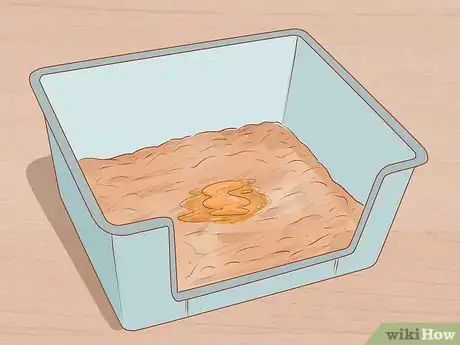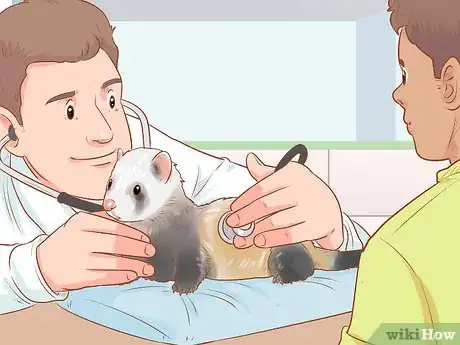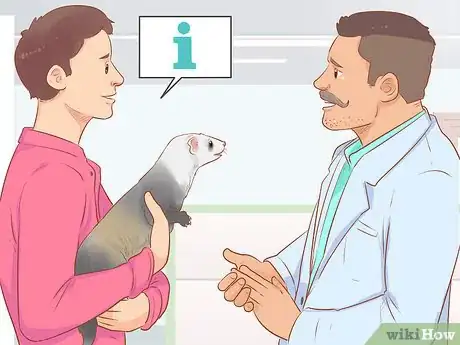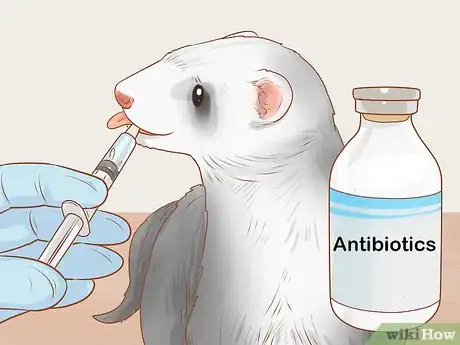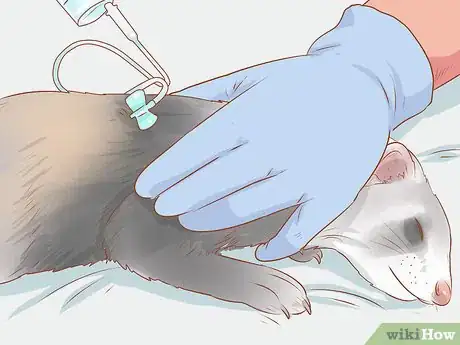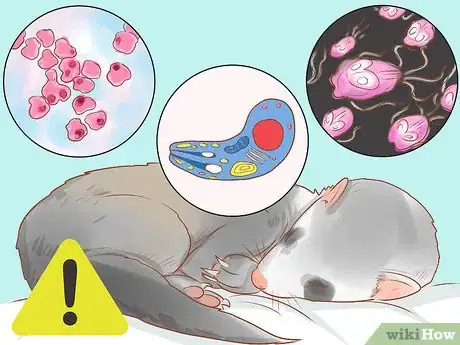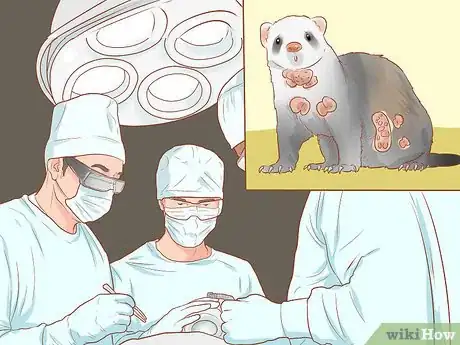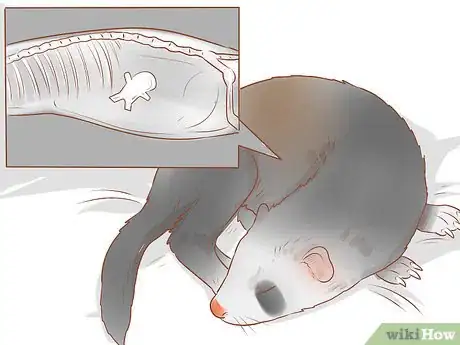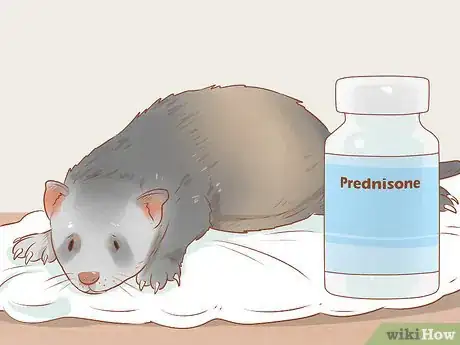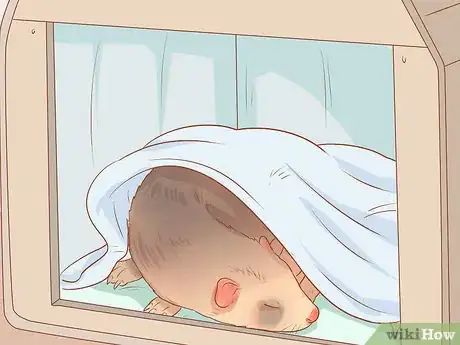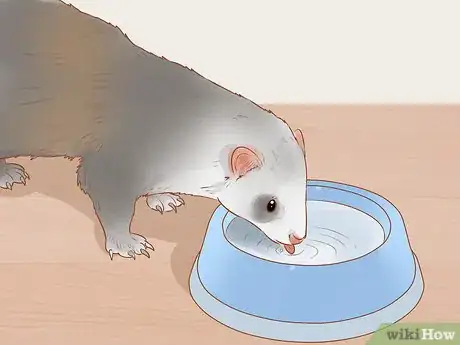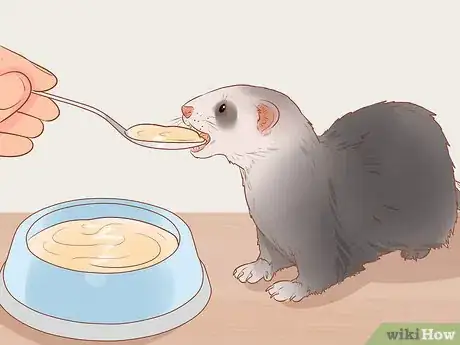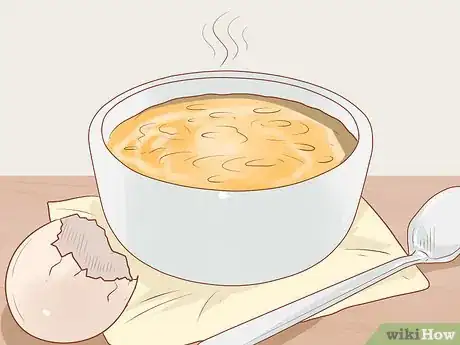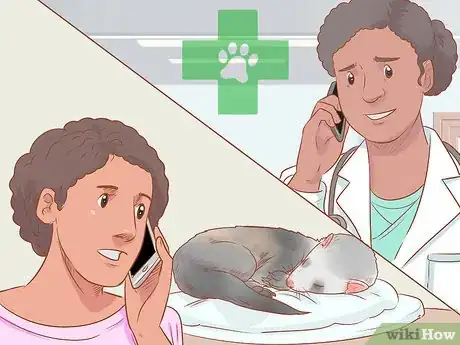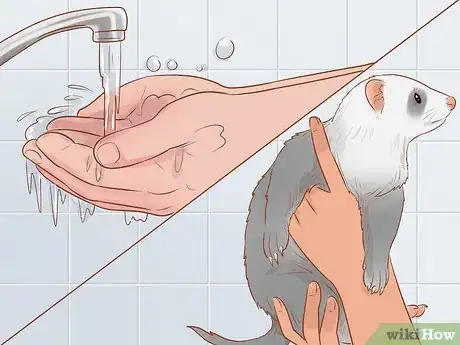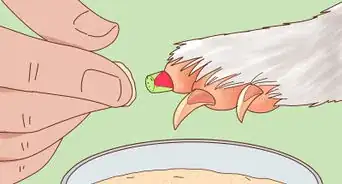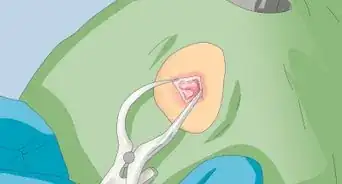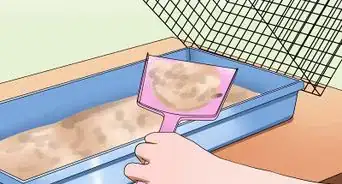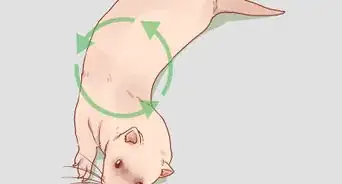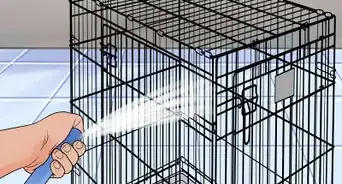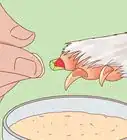This article was co-authored by Melissa Nelson, DVM, PhD and by wikiHow staff writer, Megaera Lorenz, PhD. Dr. Nelson is a Veterinarian who specializes in Companion and Large Animal Medicine in Minnesota, where she has over 18 years of experience as a veterinarian in a rural clinic. She received her Doctor of Veterinary Medicine from the University of Minnesota in 1998.
There are 9 references cited in this article, which can be found at the bottom of the page.
This article has been viewed 20,993 times.
Ferrets can get diarrhea for many reasons, including infections, parasites, chronic illnesses like inflammatory bowel disease (IBD) or lymphoma, and bad reactions to food. The way you treat your ferret’s diarrhea will depend on the underlying cause. In order to treat the diarrhea properly, work with your vet to come up with a diagnosis and treatment plan. Follow your vet’s home care instructions carefully.
Steps
Evaluating Your Ferret’s Condition
-
1Familiarize yourself with what is normal for your ferret. A ferret’s normal stool should be soft, but still formed (rather than runny).[1] Check your ferret’s cage or litter box from time to time and observe what its healthy stool looks like. If you notice anything unusual, such as stools that are runny, green, or foul-smelling, contact your vet.
-
2Take your ferret to the vet if you notice diarrhea. Diarrhea in a ferret can be a symptom of a serious underlying condition, and can cause dehydration or damage to the gastrointestinal tract if left untreated. Make an appointment with your vet to have your ferret’s condition evaluated.
- While your ferret’s diarrhea may clear up on its own, you should always contact your vet if your ferret has diarrhea for more than 24 hours.
- If you notice blood in the diarrhea, or if your ferret is unable to control the diarrhea, call your vet immediately or go to the emergency vet.[2]
- When you go to the vet, bring a sample of the ferret's feces with you in a plastic bag.
Advertisement -
3Give your vet as much information as possible. Your vet will be able to diagnose your ferret’s condition more effectively if you give them a lot of details. In addition to basic information about your ferret’s health history, your vet may want to know:[3]
- When the diarrhea started, and how frequent it is.
- Whether the diarrhea has an unusual color or strong smell.
- If you recently changed your ferret’s diet.
- If your ferret was recently exposed to a new environment or unfamiliar animal.
- Whether your ferret is showing any other symptoms (e.g., bloating, lethargy, vomiting).
Developing a Treatment Plan
-
1Give your ferret antibiotics for a bacterial infection. Bacterial diseases that can cause diarrhea in ferrets include proliferative colitis, helicobacter infections (which may lead to gastric ulcers), and campylobacter infections. Your vet may need to take a culture of your ferret’s stomach contents or do a biopsy of its intestinal tissue to diagnose a bacterial infection. These infections are treated with antibiotics.[4]
- Some bacterial infections may require a course of antibiotic treatment that lasts several weeks. Do not stop giving your ferret antibiotics until the course of treatment is complete.
- Some antibiotics, such as metronidazole (commonly prescribed for helicobacter infections), are difficult to use because they taste very bitter. If you’re having trouble getting your ferret to take its medicine, consult your vet.
-
2Treat the symptoms of a viral infection. Several viral infections can cause diarrhea in ferrets, including coronavirus and Aleutian disease. While there is no cure for a viral infection, the symptoms can be managed with proper home care or hospitalization.[5]
- Ferrets with severe diarrhea caused by viral infections may need IV fluids.
- Your vet may prescribe anti-inflammatory medications to reduce irritation in your ferret’s digestive tract.
-
3Use medication to eliminate parasites. Common ferret parasites include cryptosporidium parvum, toxoplasma gondii, and giardia. If your vet determines that your ferret has a parasite, they may prescribe a medication for the specific parasite. Follow your doctor's instructions for administering this medicine. Not all parasites can be treated in this way, however.
- In some cases, surgery may be needed to remove the parasites from your ferret's body.
- Some parasites have no known treatment. Your vet may simply give your ferret supportive treatment to keep it hydrated.
-
4Use chemotherapy or surgery to treat lymphoma. Ferrets are prone to lymphoma or lymphosarcoma, a type of cancer that can affect many different organs in the body. If your ferret is having diarrhea or other symptoms as a result of lymphoma, your vet may prescribe chemotherapy, sometimes in combination with surgery to remove tumors in the intestines.
- If your ferret is very weak or dehydrated, it may need to be hospitalized and given IV chemotherapy.
- Always wear gloves when handling oral chemotherapy medications.
-
5Ask about surgery if your ferret swallowed an object. Ferrets love to swallow things they shouldn’t, especially objects made out of soft rubber. A swallowed object can get stuck in the stomach or intestines and cause diarrhea and vomiting. Sometimes these objects will come out on their own or with the help of laxatives. However, if the object is blocking your ferret’s intestines or causing other serious problems, surgery may be necessary.[6]
- Your vet may be able to see the object with an x-ray, but in some cases they will need to do exploratory surgery to find it.
-
6Manage chronic diarrhea with steroids. If your ferret suffers from a condition that causes chronic diarrhea, like eosinophilic gastroenteritis or irritable bowel disease, your vet may prescribe prednisone. Prednisone is a steroid that reduces inflammation in the intestines.[7]
- Prednisone can be given as a tablet or a flavored liquid. Talk to your vet about which option will work best for your ferret.
- If your ferret doesn’t react well to prednisone, ask your vet about azathioprine, an immunosuppressant that can also control bowel inflammation.
-
7Change your ferret’s diet, if necessary. Your vet may determine that your ferret’s diarrhea is being caused by a food allergy or intolerance. If so, you may need to adjust your ferret’s diet. Ferrets are especially sensitive to chicken, corn, and wheat.[8] Ask your vet about putting your ferret on a hypoallergenic or limited ingredient diet.[9]
Using Good Home Care
-
1Make sure your ferret gets rest. Too much stress can make your ferret’s diarrhea worse and slow down the recovery process.[10] Keep your ferret by itself in a warm, quiet, dimly-lit area with plenty of clean, dry bedding. Make sure your ferret has access to a dark sleeping den. Keep other pets and small children away from your ferret while it is recovering.
-
2Keep your ferret hydrated. One of the greatest dangers of diarrhea in ferrets is dehydration. Make sure your ferret gets plenty of fluids during its recovery. Offer your ferret clean, fresh water in a water bottle and a water bowl. If your ferret has trouble drinking from a bowl or water bottle, try offering water in a syringe or eye dropper.[11]
- Your vet may also suggest rehydrating your ferret with a tablespoon (15 ml) of Pedialyte every hour or so.
-
3Offer your ferret mild, easy-to-digest foods. Follow your vet’s instructions for how to feed a ferret recovering from diarrhea. They may suggest a mild prescription diet, baby food, or “duck soup” (a special diet formulated for sick ferrets).[12] Consult with your vet before making any major changes to your ferret’s diet.[13]
-
4Make “duck soup” for your ferret. “Duck soup” is a rich, soothing meal for sick ferrets. To make a simple “duck soup,” boil a chicken drumstick in 3 cups (.7 liters) of water for 10 minutes. Remove the chicken and set it aside. Stir two egg yolks into the broth while it is still hot. Cut the chicken meat into small strips and add it to the broth. Allow the soup to cool, and offer it to your ferret.[14]
- If your ferret is sensitive to chicken, you may need to use an alternative, such as beef or veal. If you’re not sure what your ferret can handle, ask your vet to recommend a duck soup recipe.
-
5Monitor your ferret for new or worsening symptoms. If your ferret’s diarrhea does not improve or gets worse, or if your ferret starts to show new symptoms during treatment, contact your vet. Even if your ferret’s condition improves or remains stable, make sure to return to the vet for any scheduled follow-up appointments.
-
6Always wash your hands after handling your ferret. Some diseases that cause diarrhea in ferrets can be transmitted to humans or other pets. Wash your hands with hot, soapy water after handling your ferret or anything in your ferret’s cage, especially stools or litter.[15]
Warnings
- Never give your ferret any medication without consulting with your vet first. Some human medications are dangerous or deadly to ferrets.⧼thumbs_response⧽
References
- ↑ http://www.peteducation.com/article.cfm?c=11+2062&aid=533
- ↑ http://www.peteducation.com/article.cfm?c=11+2065&aid=2898
- ↑ http://www.peteducation.com/article.cfm?c=11+2062&aid=533
- ↑ http://www.peteducation.com/article.cfm?c=11+2062&aid=533
- ↑ http://www.peteducation.com/article.cfm?c=11+2062&aid=533
- ↑ http://azeah.com/ferrets/vomiting-swallowed-objects
- ↑ https://www.ferret.org/pdfs/health/IBD.pdf
- ↑ http://www.drsfostersmith.com/pic/article.cfm?aid=1975
- ↑ https://www.ferret.org/pdfs/health/IBD.pdf
- ↑ http://azeah.com/ferrets/diarrhea
- ↑ http://azeah.com/ferrets/diarrhea
- ↑ http://www.drsfostersmith.com/pic/article.cfm?articleid=1931
- ↑ http://www.drsfostersmith.com/pic/article.cfm?aid=1975
- ↑ http://www.food.com/recipe/ferret-duck-soup-516115
- ↑ https://www.cdc.gov/healthypets/pets/ferrets/index.html
